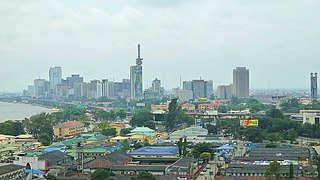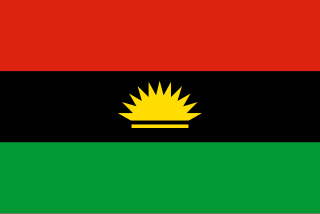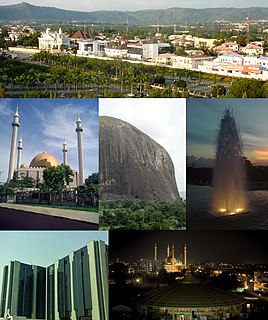Related Research Articles

Nigeria, officially the Federal Republic of Nigeria, is a country in West Africa. It is the most populous country in Africa; geographically situated between the Sahel to the north, and the Gulf of Guinea to the south in the Atlantic Ocean; covering an area of 923,769 square kilometres (356,669 sq mi), with a population of over 211 million. Nigeria borders Niger in the north, Chad in the northeast, Cameroon in the east, and Benin in the west. Nigeria is a federal republic comprising 36 states and the Federal Capital Territory, where the capital, Abuja, is located. The largest city in Nigeria is Lagos, one of the largest metropolitan areas in the world and the second-largest in Africa.

The Federal Government of Nigeria is composed of three distinct branches: legislative, executive, and judicial, whose powers are vested by the constitution of Nigeria in the national assembly, the president, and the federal courts, including the supreme court, respectively. The constitution provides a separation and balance of powers among the three branches and aims to prevent the repetition of past mistakes made by the government.

The economy of Nigeria is a middle-income, mixed economy and emerging market, with expanding manufacturing, financial, service, communications, technology and entertainment sectors. It is ranked as the 27th-largest economy in the world in terms of nominal GDP, and the 24th-largest in terms of purchasing power parity. Nigeria has the largest economy in Africa. The country's re-emergent manufacturing sector became the largest on the continent in 2013, and it produces a large proportion of goods and services for the region of West Africa. In addition, the debt-to-GDP ratio was 16.075% as of 2019.

Biafra, officially the Republic of Biafra, was a secessionist state in West Africa that separated from Nigeria and existed from May 1967 to January 1970. Its territory consisted of the southeastern region of Nigeria, which is predominantly populated by the Igbo people. Biafra was formed by Igbo nationalists who believed they could no longer coexist with Nigeria, leading to the Nigerian Civil War. Nigeria declared war on Biafra shortly after its declaration of independence, eventually resulting in the defeat of Biafra and the reunification of the two states.

Abuja is the capital and eighth most populous city of Nigeria. Located in the centre of the country within the Federal Capital Territory (FCT), it is a planned city built in the 1980s based on a master plan by Japanese architect Kenzo Tange. It replaced Lagos, the country's most populous city, as the capital on 12 December 1991.

Lagos is the largest city in Nigeria and the most populous city in Africa, with a population of 14.8 million as of 2015 within the city proper. The Lagos metropolitan area has a total population of roughly 23.5 million as of 2018, making it the the largest metropolitan area in Africa. Lagos is a major African financial centre and is the economic hub of Lagos State and Nigeria at large. Lagos is also among the top ten of the world's fastest-growing cities and urban areas. The megacity has the fourth-highest GDP in Africa and houses one of the largest and busiest seaports on the continent. The Lagos metropolitan area is a major educational and cultural centre in Sub Saharan Africa.

Nigeria is a federation of 36 states and 1 federal capital territory. Each of the 36 states is a semi-autonomous political unit that shares powers with the Federal Government as enumerated under the Constitution of the Federal Republic of Nigeria. The Federal Capital Territory, also known as FCT, is the capital of Nigeria and located in the city of Abuja. FCT is not a state but is administered by elected officials who are supervised by the Federal Government. Each state is sub-divided into Local Government Areas (LGAs). There are 774 local government in Nigeria. Under the Constitution, the 36 states are co-equal but not supreme because sovereignty resides with the Federal Government. The constitution can be amended by the National Assembly, but each amendment must be ratified by two-thirds of the 36 states of the federation.

The Igbo people ( EE-boh, also ; also spelled Ibo and formerly also Iboe, Ebo, Eboe, Eboans, Heebo; natively Ṇ́dị́ Ìgbò In Nigeria, Igbos are indigenous to various states. Igbos are majorly found in Abia, Anambra, Ebonyi, Enugu and Imo States. A good population of Igbos are found in Delta and Rivers States while Igbos are a minority in Akwa ibom, Benue, Cross River, Edo and Kogi states. Large ethnic Igbo populations are found in Cameroon, Gabon, and Equatorial Guinea, as well as outside Africa. There has been much speculation about the origins of the Igbo people, as it is unknown how exactly the group came to form. Geographically, the Igbo homeland is divided into two unequal sections by the Niger River – an eastern and a western section. The Igbo people are one of the largest ethnic groups in Africa.

The president of the Federal Republic of Nigeria is the head of state and head of government of the Federal Republic of Nigeria. The president of Nigeria is also the commander-in-chief of the Nigerian Armed Forces. The president is elected in national elections which take place every four years. The offices, powers, and titles of the head of state and the head of government were officially merged into the office of the presidency under the 1979 Constitution of Nigeria. The current president, Muhammadu Buhari, took office on May 29, 2015, as the 15th president of the Federal Republic of Nigeria.

Muhammadu Buhari is a Nigerian politician who has been president of Nigeria since 2015.

The Nigerian Civil War was a civil war fought between the government of Nigeria and the Republic of Biafra, a secessionist state which had declared its independence from Nigeria in 1967. Nigeria was led by General Yakubu Gowon, while Biafra was led by Lt. Colonel Odumegwu Ojukwu. Biafra represented the nationalist aspirations of the Igbo ethnic group, whose leadership felt they could no longer coexist with the federal government dominated by the interests of the Muslim Hausa-Fulanis of northern Nigeria. The conflict resulted from political, economic, ethnic, cultural and religious tensions which preceded Britain's formal decolonization of Nigeria from 1960 to 1963. Immediate causes of the war in 1966 included ethno-religious violence and anti-Igbo pogroms in Northern Nigeria, a military coup, a counter-coup and persecution of Igbo living in Northern Nigeria. Control over the lucrative oil production in the Niger Delta also played a vital strategic role.

The Nigeria national football team represents Nigeria in men's international football. Governed by the Nigeria Football Federation (NFF), they are three-time Africa Cup of Nations winners, with their most recent title in 2013. In April 1994, the Nigerian national football team was ranked 5th in the FIFA rankings, the highest FIFA ranking position ever achieved by an African football team. Throughout history, the team has qualified for six of the last seven FIFA World Cups, missing only the 2006 edition and reaching the round of 16 on three occasions. Their first World Cup appearance was the 1994 edition. The team represents FIFA and Confederation of African Football (CAF).

Edo State is one of the 36 states of Nigeria, located in the southern region of the country. As of 2006 National population census, the state was ranked as the 24th populated state in Nigeria. The state's capital and city, Benin City, is the fourth largest city in Nigeria, and the centre of the country's rubber industry. Created in 1991 from the former Bendel State, Edo State borders Kogi State to the northeast, Anambra State to the east, Delta State to the southeast, and Ondo State to the west.

The Nigeria Football Federation is Nigeria's football governing body. It was formally launched in 1945 and formed the first Nigerian national football team in 1949. It joined CAF in 1959 and FIFA in 1960. The NFF headquarters is located in the city of Abuja.

The House of Representatives is the lower chamber of Nigeria's bicameral National Assembly. The Senate is the upper chamber.
Nigeria has 774 local government areas (LGAs), with each being administered by a local government council consisting of a Chairman, who is the chief executive, and other elected members, WHO ARE referred to as Councillors. Each LGA is further subdivided into a minimum of 10 and a maximum of 20 Wards. A Ward is administered by a Councillor, who reports directly to the LGA Chairman. The Councillors fall under the legislative arm of the local government, the third tier of government in Nigeria, below the state governments and the federal government.

There are over 527 native languages spoken in Nigeria. The official language of Nigeria is English, the language of former colonial British Nigeria. As reported in 2003, Nigerian English and Nigerian Pidgin were spoken as a second language by 100 million people in Nigeria. Communication in the English language is much more popular in the country's urban communities than it is in the rural areas, due to globalization.

Nigerians or the Nigerian people are citizens of Nigeria or people with ancestry from Nigeria. Nigeria is composed of various ethnic groups and cultures and the term Nigerian refers to a citizenship-based civic nationality. Nigerians derive from over 250 ethnic groups and languages. Though there are multiple ethnic groups in Nigeria, economic factors result in significant mobility of Nigerians of multiple ethnic and religious backgrounds to reside in territories in Nigeria that are outside their ethnic or religious background, resulting in the mixing of the various ethnic and religious groups, especially in Nigeria's cities. The English language is the lingua franca of Nigerians. 53.5% of Nigerians are Muslims and about 45.5% are Christians, this was as a result of the population which the northern region has a larger landmass than both the Western and Eastern regions combined.

Boko Haram, officially known as Jamā'at Ahl as-Sunnah lid-Da'wah wa'l-Jihād, is a terrorist organization based in northeastern Nigeria, which is also active in Chad, Niger and northern Cameroon. In 2016, the group split, resulting in the emergence of a hostile faction known as the Islamic State's West Africa Province.

The Boko Haram insurgency began in July 2009, when the militant Islamist and jihadist rebel group Boko Haram started an armed rebellion against the government of Nigeria. The conflict takes place within the context of long-standing issues of religious violence between Nigeria's Muslim and Christian communities, and the insurgents' ultimate aim is to establish an Islamic state in the region.
References
- ↑ Talbot, Percy Amaury (2013-10-08). Life in Southern Nigeria: The Magic, Beliefs and Customs of the Ibibio Tribe. Routledge. ISBN 9781136968822.